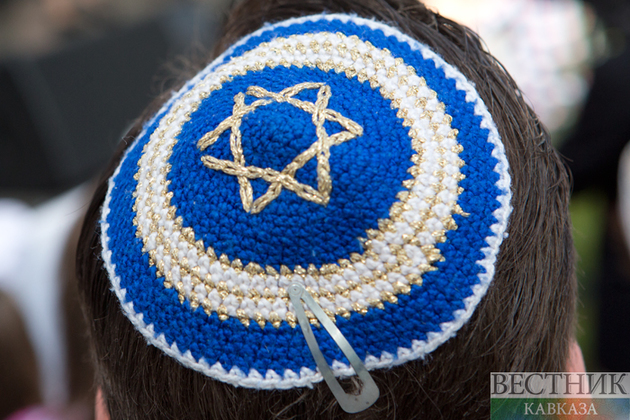The Egyptian government announced the launch of restoration works at the Ben Ezra Synagogue in Old Cairo, as part of efforts to revive Jewish heritage and attract more tourists to the country.
According to Al Monitor, on April 18, the Egyptian Ministry of Tourism and Antiquities announced the start of restoration work at the Ben Ezra Synagogue in the Religious Complex of historic Cairo. Archaeologists and analysts say the Egyptian government's attention to Jewish heritage is in part a bid to attract more tourists. Secretary-General of the Supreme Council of Antiquities in Egypt Mustafa Waziri said in a press statement that the synagogue located inside the Babylon Fortress is considered the oldest synagogue in Egypt. The last restoration work at the site was in 1991, he said.
Mustafa Abdel-Fattah, head of the committee supervising the restoration process, said that the renovation works in the synagogue began with preliminary cleaning of the walls. Further work will include insulating surfaces to protect against moisture, protecting color layers from the influence of weather, and treating cracks.
The temple is named after Jewish scholar and philosopher Ezra, and a collection of historical documents known as the Cairo Geniza was found there in the 19th century. The synagogue was built in the Middle Ages in the style of cathedrals and is oriented toward Jerusalem. Its current building dates back to the 1890s.
It consists of two floors, like other synagogues, with the bottom for men and the upper one for women. In the middle is the raised platform where most of the service takes place. In the east of the synagogue is an ark for the Torah scrolls, according to the Ministry of Tourism and Antiquities.
Abdel Rahim Rihan, director general of archaeological research and studies in South Sinai Department at the Ministry of Tourism and Antiquities, told Al-Monitor that the Ben Ezra Synagogue includes symbols belonging to Judaism, Christianity and Islam.
Jewish antiquities in Egypt have suffered from marginalization and neglect since most of the Jews were expelled from Egypt during the 1960s. More recently, popular calls began to emerge to preserve and revive Jewish heritage.
Since 2016, Magda Haroun, the president of the Drop of Milk association, has been working to encourage the Jews of Egypt to revive and protect their heritage. The numbers are small; six are believed to be living in Cairo, while dozens are in Alexandria. Also in 2016, Egyptian authorities formed a committee for “inventorying and registering Jewish antiquities,” which registered 13 synagogues along with the Jewish cemeteries in Cairo and Alexandria. “The registration of these temples means that the government is obligated to preserve and restore them and put them on the map of visits and archaeological sites,” Rihan said.
In 2020, the Ministry of Tourism and Antiquities inaugurated the Eliyahu Hanavi Synagogue in Alexandria after its restoration. The ministry pledged that the restoration of the rest of the synagogues would roll out successively. Also in 2020, the US Embassy in Cairo launched a project to preserve Jewish cemeteries in al-Basateen area, south of Cairo, in cooperation with the Drop of Milk association.
The restoration work means a great deal to Jewish people everywhere, said Ksenia Svetlova, director of the Israel-Middle East program at the Israeli Mitvim Institute for Regional Foreign Policy. Svetlova, who during her time as a member of the Israeli Knesset established a parliamentary lobby to protect Jewish heritage in Arab and Muslim countries, told Al-Monitor, “Jews have a long history in Egypt. Their heritage is part of Egyptian heritage and it's good to know that synagogues and ancient cemeteries are protected and revived.”
In a 2018 report, the Washington Institute for Near East Studies said that promoting tourism is one of the Egyptian government's motivations for reviving Jewish heritage. In March 2020, Egyptian Minister of Tourism and Antiquities Khaled al-Anani told the BBC, “The aim of these plans is to encourage religious tourism in the country.”
After the restoration, the Eliyahu Hanavi Synagogue received dozens of Jews of Egyptian origin or those who lived in Egypt from Israel and the diaspora. Egyptian tourism has seen several setbacks since the 2011 revolution, and now most recently, it has been affected by the Ukrainian crisis. But the government is seeking to compensate by attracting more Israeli tourists.
The Ben Ezra Synagogue announcement came a day after the first direct flight between Tel Aviv and Sharm el-Sheikh. Earlier in October 2021, state-owned EgyptAir began operating four weekly flights between Cairo and Tel Aviv. The Israeli embassy in Egypt expected that the number of Israeli tourists during the Passover holiday would reach 45,000.
Thousands of Israeli tourists visit Egypt annually, especially the Sinai and the Red Sea resorts, but few visit Cairo and other governorates. Reviving Jewish heritage may help increase tourism in the heart of Cairo, according to Rihan. Svetlova said that Israeli citizens may obtain a tourist visa from the Egyptian embassy in Tel Aviv and travel throughout the country.
“The restoration of Jewish heritage sites in Egypt definitely reflects on better relations between the two countries in recent years,” she said. "There is more economic cooperation and diplomatic activity, in addition to traditional cooperation in the sphere of security." Although challenges remain, she said, "Egypt is important to Israel, as a key Arab state and a neighbor. Hopefully, there will be more rapprochement since the potential in economy, tourism, academic exchange and security is enormous.”






